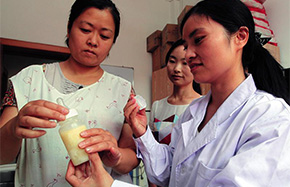Xinjiang program preparing students for the future
URUMQI -- Eighth-grader Tajinitsa's school is 1,000 kilometers from her hometown. Although she misses her parents, when she broke her leg, no one could convince her to return home. She was determined to stay at school.
Tajinitsa comes from Kashgar, a city in the south of Xinjiang Uygur autonomous region, but studies at No 66 School in Urumqi, the regional capital. She returns home once a year, for two months in summer. The other 10 months she lives at the boarding school with her classmates and teachers.
She is in a competitive but promising program that takes children from Xinjiang's remote and impoverished areas and allows them to study at the region's top junior high schools, preparing them to attend senior high schools in central, east and southern parts of China. In 2016, 10,600 students, 90 percent of whom were from ethnic minority groups, entered the program.
It aims to provide access to higher quality education for children from poor areas of Xinjiang, said Qu Mingcai, principal of No. 66.
The school was established in 2004, specifically to host the program. Previously, the campus was a vocational college. The school has grown and now has two campuses in Urumqi.
The more than 2,200 students at No 66 will compete to get into secondary schools in over 17 cities including Beijing, Shanghai and Shenzhen. "It is very difficult to get accepted for No. 66, because it is one of the best schools in the city. Studying here makes it easier to get into China's top universities," said Tajinitsa, who is ethnically Uygur.
"My grandparents said girls don't need to go to school. Several of my cousins have dropped out. Luckily my parents are more open-minded," she added.
"Last semester, I broke my leg. My father wanted me to return to Kashgar. But I said no, I couldn't possible attend a mediocre school now."
GETTING INTO GOOD UNIVERSITIES
A total of 30 Xinjiang schools host the program. "Their students have better chances to get into the top universities in China, like Peking and Tsinghua," said Qu.
The central government funds the entire program, including accommodation, meals, stationary, tuition, and transportation between home and school, at a cost of around 8,000 yuan (about $1,160) per student per year.
"There is fierce competition to get accepted. Students must have high grades and be extremely motivated," said Qu.
"Many graduates are engineers, doctors, or public servants. One of our alumni just told me he was accepted into Beihang University," said Zhang Hua, the school's Communist Party secretary.
"Because it's a boarding school, students form strong bonds with their teachers," she said.
Each class has around 50 students and two head teachers, one responsible for student's academic progress and the other for their life outside of class. Piano teacher Wu Dan, 25, joined No 66 last year as a head teacher.
Wu supervises mealtimes, hands out snacks, cares for sick or injured students and keeps in touch with their parents. She lives in the dormitory with the students.
"This is a very diverse bunch of adolescents, but most students are self-disciplined, so it is not very difficult to keep an eye on them," she said.
BILINGUAL, MULTI-CULTURAL
Bridging ethnic and language differences is one of the main tasks of the school, which includes students from 13 different ethnic groups.
Many ethnic Uygur, Kazakh and Kyrgyz students arrive at the school speaking very little Mandarin Chinese. At elementary schools, courses are often taught in the local language or dialect, due to a shortage of teachers who speak fluent Mandarin.
"No. 66 has crash courses in Mandarin for first year students. Most classes, such as maths and sciences, are taught in Mandarin to better prepare children for future exams," said Qu. The school also teaches English and has classes on Uygur language and culture.
"The children live, eat and play together. We think this is a good way to promote harmony and solidarity across ethnic groups," said Zhang.
Xiong Yue, another eighth-grader from Kashgar, is one of the handful of Han Chinese students at the school. "I can also speak Uygur. It's easy to learn it from my peers, because we are always together," he said. Xiong helps run the school's geography club which has over 30 members.
Nusiredula Adili is the youngest son of a Uygur family from a village near Kashgar. His oldest sister, a graduate of the same program, is studying information technology at Ningxia University. His second sister goes to a local high school.
"Studying hard is the only way I will succeed. In the future I want to be a bilingual TV host, or maybe a singer," he said.
- Preserving a Chinese icon: Great Wall needs rescue
- Chinese museums receive 900m visitors each year
- Chinese man sentenced over selling wildlife online
- Former senior Jiangsu official sentenced to four years for bribery, illegal foreign exchange purchase
- Police crack down on illegal online animal trade

























